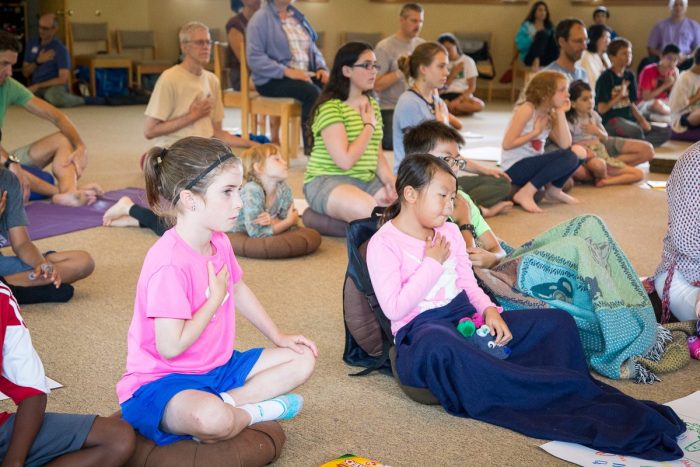In the 1964 movie Zorba the Greek, Zorba humorously refers to family life and parenting as “the full catastrophe,” striking such a chord in audiences that the comic phrase was adopted into English vocabulary.
Dr. Jon Kabat-Zinn, the father of western mindfulness, sees full catastrophe living in a positive light—to be embraced, not bemoaned, as it reflects the variety and richness intrinsic to a life fully lived.
A bit akin to the full catastrophe, I offer the art of river-running as an analogy of the parenting experience. In my early days of whitewater kayaking, I recall a class IV trip in Idaho where—sprayskirt intact—I push away from the shore at put-in. Suddenly I am struck with the fact that there is no turning back and I feel wholly unqualified. I don’t know what lies ahead and I am not sure how I will meet it, but for better or for worse— I’m committed! The journey is at moments exhilarating, exhausting, fun and anxiety-producing. Flexibility, steadiness, and vigilance are both required, and honed in the process. At times I am in over my head, stumbling, and consumed with doubt. To make it through, I tap into inner resources I didn’t know existed, or I humbly ask for help. Looking back, what I recall most vividly is the breathtaking beauty, the sense of deep connection, and the awe of the journey itself. Much like parenting.
Child-rearing is a committed immersion into relationality. As fulfilling as it can be, at times it feels akin to trial by fire, like a piece of wrought iron being cast unwittingly into the forge. Raising children throws the mirror up, challenging us to look closely at ourselves, humbling us in our humanity, adding grist to the mill.
From a Buddhadharma perspective, parenting is fertile ground for the worldly winds of blame and shame and offers us rich fodder for mindfulness practice. Cultivating the antidotes of forgiveness and kindness is like having a reliable rudder to keep on course with our heart’s intentions.
Kindness is the bridge that begins to dissolve the imaginary borders that separate us. It is what is left when our defenses melt away. Kindness is at the core of the Buddhadharma. As the Dalai Lama himself noted, “My religion is very simple. My religion is kindness”. Child-rearing is the source for so much “becoming”. There is no more deserved place to water the seeds of kindness than within family life.
Yet kindness is often not easy. This is why it is a practice.
We are born of a deep conditioning. The grooves of our neuronal pathways have been carved and set over eons, hard-wired for fight, flight, or freeze. Although this protective mechanism serves us well in certain areas of our lives (such as, don’t get hit by the bus!), it can go against us in other areas (such as, being kind feels too vulnerable!). Mindfulness meditation offers gentle tools to help us re-wire our thankfully neuroplastic brains.
How can we plant seeds of kindness within ourselves and our children in practical, simple and fun ways, amidst our oft-times hectic, messy, and unpredictable family lives?
This is a question we continually explore in our Family Mindfulness Program. Below are a few activities and resources for inclining our hearts and minds toward a most fundamental form of kindness—self-kindness.
In the words of Thich Nhat Hanh, “To meditate means to go home to yourself. Then you know how to take care of the things that are happening inside you, and you know how to take care of the things that happen around you.”
Mindfulness is a skill that takes time to hone, and that is why we refer to a “meditation practice.” A loving gift we can offer ourselves is the opportunity to pause, to hone the skill of coming home through meditation. Taking care of one’s self—putting on one’s own oxygen mask first—builds our capacity to be more fully present for others. When we come home to ourselves with a friendly attitude, our bucket begins to fill. Like a pebble dropped in still water, the benefits ripple out. Pema Chodren reminds us, “Loving kindness towards ourselves doesn’t mean getting rid of anything. It means we can still be crazy after all these years. We can still be angry after all these years. We can still be timid or jealous or full of feelings of unworthiness. The point is not to try to throw ourselves away and become something better. It’s about befriending who we are already.”
- Kind Wishes Meditation: Offering ourselves kindness on purpose acts as an antidote to the negativity bias of our brains. Close your eyes and sit comfortably. Picture yourself somewhere you love to be, doing something that makes you smile. Pay attention to how this makes you feel and where you feel this in your body. Now, send kind wishes to yourself. Here are examples of phrases you might use: “I wish to be happy. I wish to be healthy. I wish to be peaceful. I wish to take good care of myself. I wish to be kind to myself. I wish to be kind to others.” Add your own wishes. Notice how your heart is feeling. Take a few full breaths and then open your eyes. Notice that this took only a few minutes!
- Three Breaths At the Door: The first time you head out the door each day, before turning the doorknob — pause. If with your child, hold hands. Take 3 deep breaths. After the first breath — offer a kind wish for yourself for the day. Second breath — offer a kind wish for your loved ones. Third breath — offer a kind wish for all beings in the world. This is a wonderful way to place your rudder in the water for the day, set a kind tone, and remember your heart-felt motivation and intention.
- Thich Nhat Hanh’s Four Pebble Meditation: Children enjoy leading this activity. Sit comfortably. Place 4 pebbles by your side. For each of the 4 contemplations, take a pebble at a time and place it in the palm of your hand. Take 3 breaths between each contemplation. Ring a chime or bell at the beginning and end to establish sacred space.
- Flower: Bring to mind a beautiful flower. Imagine its fragrance, color, and shape. A flower is fresh, beautiful, and alive. Human beings are flowers, yet sometimes we forget. Breathing in, silently say, “I see myself as a flower”. Breathing out — “I feel fresh. Flower, fresh.”
- Mountain: Imagine a beautiful and solid mountain. We also have stability, like a mountain. Breathing in – “I feel solid”. Breathing out – “I am a mountain. Mountain, solid.”
- Water: Imagine still water. When our minds are still, they reflect what is truly happening. “Breathing in – I am still, clear water.” Breathing out – “I reflect things as they truly are. Clear water, reflecting”.
- Space: Imagine the space around & inside of you. We all need space to feel free. Breathing in – “I see space within me”. Breathing out – “I feel free. Space, free.”
- Self-kindness Bracelets: This is a family activity. All that is needed is string and beads. Everyone makes their own bracelet. Each bead placed represents a quality you appreciate about yourself. As you make the bracelet, share the qualities you chose with one another.This is a great opportunity for connection. And when wearing the bracelet, it can serve as a reminder of your goodness.

 Share on bsky
Share on bsky







Read 2 comments and reply